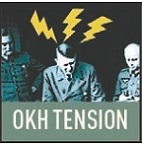Mehring
Posts: 2179
Joined: 1/25/2007
Status: offline

|
Supply drops could be controlled a number of ways as I've suggested before, without stopping them, which would be plain wrong. You could-
1. Reduce the recipient's MPs as the supply echelon particularly are presumably in place collecting and administering the drops.
2. Make any drops to non-isolated units dependant upon a command morale roll, perhaps modified by leader initiative. Fail the roll, no drop.
3. Stop bombers carrying fuel outright if, as someone here suggested, it is ahistorical.
4. Sort out the supply flows and throughputs so only historical levels of supply are available to be transported. I'm perhaps wrong here, but it often seems air forces draw from an unlimited pool of supplies.
Here's some suggestions I was putting together a while back which might be of use-
Having ranted at length over the current logistics system for some while, it’s good to see that the issue is getting some attention in WitW and doubtless future incarnations of WitE. A number of other players have also raised the issue, including the aspect of player determined supply prioritisation as a replacement for the gamey HQ build up. Here’s what has been forming in my mind over the months as an alternative sub-system. That ports, roads and rail tracks are all rated for throughput capacity and rolling stock used for supply is deducted from the national capability is a given. Transport capacity could be allocated to various, perhaps player determined logistics zones and travel between them. Each zone would have a carriage pool.
Each nation generates supplies from its resources and industries and the means to move them about. While a player could attend to supply allocation to some extent during their normal player turn, logistics could be finalised for the next turn in a new game phase (I’m also considering a system in which supply/transport for the upcoming turn is allocated prior to the normal game turn- more fiddly but fun).
Set to default, the computer will attempt to evenly distribute supplies to all friendly units within supply range, up to 100% for each supply type. This might be reduced by throughput choke points, lack of rolling stock and vehicles.
A new map mode would show the throughput capacity of friendly transport infrastructure and estimate that of enemy controlled territory, from friendly supply centres to any point on the map. Surplus might be stored or moved to forward supply centres if possible. If poor weather, interdiction or changes to the anticipated supply route prevented its timely delivery, the supplies and transports should remain in transit, using throughput capacity in their location, for the next week. Likewise, if the supply route were excessively long, it might take more than a week for a supply allocation to arrive, leaving it in transit. Avoidance or the latter situation might make advantageous, the establishment of forward supply centres.
In this map mode, HQs (and units not drawing supply from HQs) would indicate their supply need for the upcoming turn. Subject to transport and infrastructure, a player could then manage the supply his logistics system would attempt to deliver each HQ, enabling supply build-up or, to some extent, player determined deprivation.
As each HQ is allocated supplies, the game computes the use of transport along the entire route, which is deducted from a visible pool of available ships/trucks/rolling stock/carts etc. by logistics zone. Until finalised, supply can be adjusted and transport returned to the pools if desired. A player could modify their transport allocation by needed + x% in anticipation of adverse weather conditions or other problems, more transport enabling more supplies to reach their destination on time.
Interdiction by artillery, partisans and aircraft along the supply route would then delay, damage and destroy supplies and transports, in the first case, leaving surviving material in transit should the delay be greater than the time needed to deliver the supplies.
_____________________________
“Old age is the most unexpected of all things that can happen to a man.”
-Leon Trotsky
|
 Printable Version
Printable Version






 After I told you that there was no point in continuing, you remarked: "I didn't believe you could cut off the troops you mention, please do it, :)" So, I did.
After I told you that there was no point in continuing, you remarked: "I didn't believe you could cut off the troops you mention, please do it, :)" So, I did. 








 And nothing will be railed to Romania.
And nothing will be railed to Romania.

 New Messages
New Messages No New Messages
No New Messages Hot Topic w/ New Messages
Hot Topic w/ New Messages Hot Topic w/o New Messages
Hot Topic w/o New Messages Locked w/ New Messages
Locked w/ New Messages Locked w/o New Messages
Locked w/o New Messages Post New Thread
Post New Thread